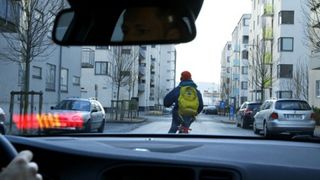Your city is stupid
Smart cities are great in theory, tricky in practice
Drones and driverless cars
Driverless cars are a hot topic right now and the conversation is only going to get more interesting. The main infrastructure for autonomous vehicles is already in place: roads. The other stuff - refuelling stations, standardised safety protocols - is simply a problem for technology to solve.
With Uber causing huge disruptions in transports, it's feasible that we could be moving toward a time when fewer city dwellers actually own vehicles. Uber has been open about its interest in autonomous vehicles, and why wouldn't it be? Not only would a trend away from ownership and toward autonomous road transport present a cost saving to people, it might also be the solution to rising traffic congestion.
The use of drones, and the laws governing them, makes for another interesting conversation that's only just begun. While Amazon works to get its delivery drones off the ground, city planners are starting to look at how drones will play a role in urban planning and management - and the costs this could bring about.

"Think about Alaska or an oil crack or refinery: drones are the perfect alternative [to sending a person]," says Qualcomm's Kiva Algood. "In some instances they're spending as much on insurance and labour as they are on deployment."
"Intelligent connectivity can help with that as well. One of our partners does a lot on wind turbines and the engine on a wind turbine is about $350,000 dollars, pretty expensive. To send a mechanic out there along with all the equipment, it's close to the same amount. But if you sent a drone to see what's going on, you can have a better idea of what equipment to take."
After an earthquake, people risk their lives to inspect damaged buildings, but drones would allow them to carry out the inspection at no human cost, and possibly cover more ground in a shorter space of time. A team of German developers have already developed a drone for this purpose, and their next goal is to make it fly on autopilot.
Scare cities
While most of these things sound hugely beneficial, enacting it isn't always so simple. In fact, convincing cities of the benefits of "smart" ideas can be surprisingly difficult.
Get daily insight, inspiration and deals in your inbox
Get the hottest deals available in your inbox plus news, reviews, opinion, analysis and more from the TechRadar team.
"The main issue is that they don't want to be first and they don't want to fail," says Algood. Cities have already been burned, too. "Pittsburgh is a great example where someone sold them a proprietary Wi-Fi mesh. They were given all the hardware for free, and the next thing you know they have no way to monetise it, they can't stand it up, they get more calls from citizens."
Smart cities make for a lot of work, they throw up a lot of data that somebody has to deal with, and they can easily turn into complaint factories. Many cities are reaching breaking points and will have to adapt.
"City governments are designed not to change," says Shawn Slack, Chief Information Officer of the City of Mississauga, Canada. "But on the other hand I think there's an incredible pressure put on cities to use common sense ways of using today's technology to make better cities. But the risk for failure is incredibly high. You don't have the ability like in the tech world to fail early and fail fast."
Where do we go from here?
All of the above merely scratches the surface of a topic that will continue to unravel, but right now one of the best ways to know how a city can become "smarter" is to simply ask its citizens. What are the frustrations they face? What are the problems that need fixing? What would make their lives easier each day? Start at the problem, not the technology.
"A smart city is just a lens," says Slack. "We use our strategic plans and our business plans to define the long-term objectives of what we're trying to achieve and then technology enables to help and enhance those services. The smart city lens is just another way to look at the question".
"I came here to this conference thinking we are a smart city, but that's not our label," he adds at Yinchuan's smart city summit. "It's just a different lens to looking at how we deliver services. If we all came to talk about economic development or some other way of looking at it, I don't think we'd have the same end result."
There's a lot more to talk about, and cities will benefit from keeping the discussion open and sharing ideas with one another. "Smart city" is a term we're going to hear more and more about, especially as city authorities find new ways of using technology and data in a way that benefits everyone.
"We're beginning to see a convergence of communications technology with computing technology," says Paul Wilson of Bristol Is Open, who sees the smart city as part of a greater technological breakthrough. "I think the point of computing might be about to happen. We assume with Microsoft, Google, IBM... we think it's kind of done, but I think the computer's about to leave the box and go into society."
Hugh Langley is the ex-News Editor of TechRadar. He had written for many magazines and websites including Business Insider, The Telegraph, IGN, Gizmodo, Entrepreneur Magazine, WIRED (UK), TrustedReviews, Business Insider Australia, Business Insider India, Business Insider Singapore, Wareable, The Ambient and more.
Hugh is now a correspondent at Business Insider covering Google and Alphabet, and has the unfortunate distinction of accidentally linking the TechRadar homepage to a rival publication.
Most Popular


